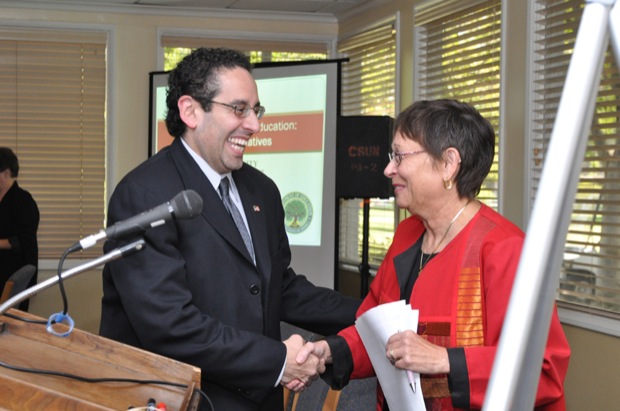
CSU Chancellor Charles B. Reed did not attend an event on education hosted by CSUN where students planned to protest tuition hikes and furloughs.
Reed had been scheduled to attend the White House Initiative on Educational Excellence for Hispanic Americans, held at the Orange Grove Bistro; the event was attended by a diverse audience of about 135 people expecting him to be there. Instead, the community conversation was led by the initiative’s Executive Director Juan Sepulveda and CSUN President Jolene Koester.
“It’s disappointing that he did not show up,” said junior Daniel Santana, a double major in Chicano/Chicana studies and history and a member of Students for Quality Education (SQE). “It’s an insult that he wouldn’t show up to an event that has to do with our education.”
Over a dozen SQE members, along with Santana, gathered in full view of those in attendance with banners and picket signs that read: “Stop Raising My Tuition.”
“We wanted to address the 32 percent fee increase and how that’s shutting the door not only on mi
nority students but all students,” Santos said.
Koester opened the event by acknowledging leaders in both K-through-12 education and higher education who were present. There was no mention of Reed.
“I am here representing both the CSU and California State U
niversity, Northridge,” said Koester. “Both entities (are) committed to the success and enrollment, the retention and of course the graduation of our Latino students.”
Reed could not be reached for comment in time for publication.
Koester said that a few years ago CSUN was chosen as one of the universities in the country with higher-than-expected retention and graduation rates for its Latino students.
“It was an honor for us to learn that this White House Initiative headed by Juan Sepulveda wanted to come to Cal State Northridge to do a listening tour,” Koester said.
Sepulveda said his goal was to make people aware that the White House has had a Latino initiative since 1990 and to obtain feedback from those in attendance — feedback on what the Obama administration should be focusing on to make sure Latinos can get through the education system, he said.
“We thought it was important for me and my office not to come to tell you what we are going to be doing but to ask you what we should be doing,” said Sepulveda, who then only heard from six volunteers and asked the rest of the crowd to have individual discussions at their respective tables. People were then asked to turn in note cards with their concerns and solutions.
Sepulveda added that he was aware of the “bad things going on and people can complain to me” but that he was looking for possible solutions. Most comments focused on the budget crisis and the impact it is having on students of color.
“Whenever there is a budget crisis, the budget cuts in the CSU are balanced from the backs of our students and our faculty,” said a volunteer speaker who did not identify herself.
The volunteers also focused on the lack of guidance that Latino students face both at home (since many are the first in their families to attend college) and school because they lack mentors.
Alex Hernandez, a double major in Chicano/Chicana studies and graphic design, said that most important was the role that leaders played in students’ education as they are able to help them attain a higher education. He added that the current lack of leadership “in California decision makers was literally pricing students out of college.”
“I was expecting Chancellor Reed to be at the event,” Hernandez said. “He’s the one making all these decisions for us. And as a student it worries me that this man isn’t here, because he is supposed to be representing us. So where is he?”





